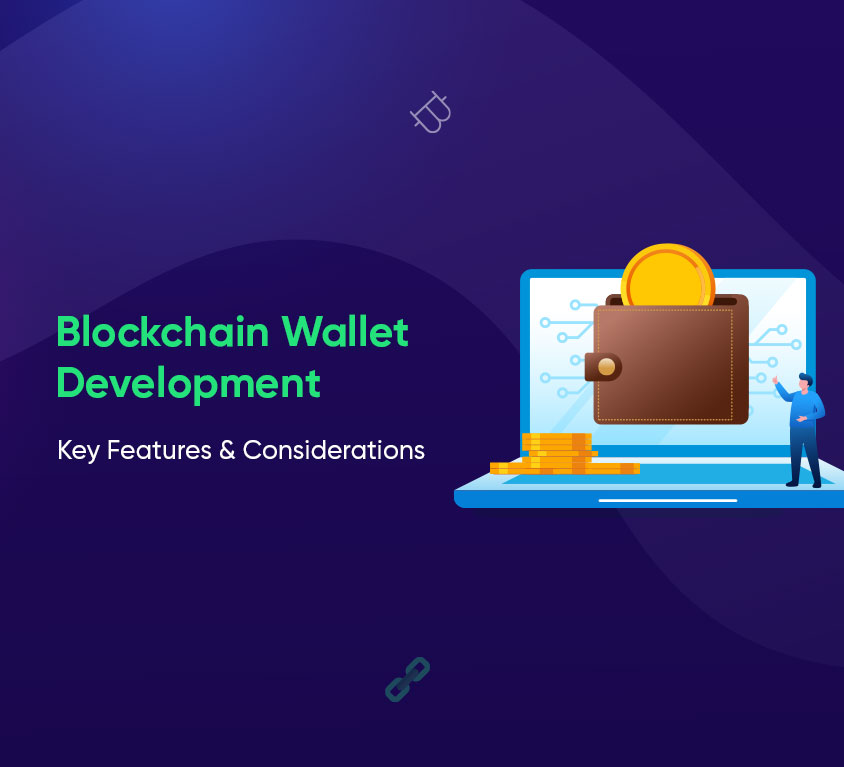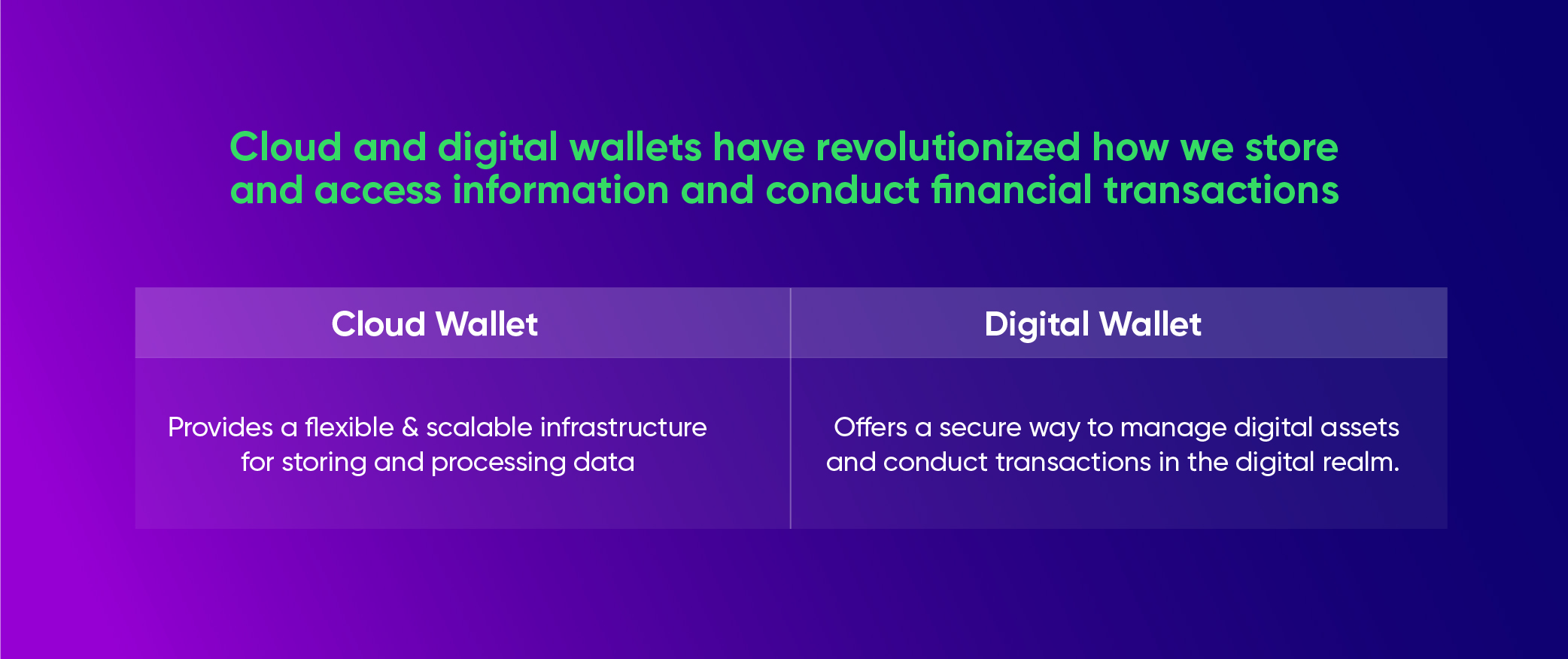
Introduction
Blockchain & Web3 Services Trusted By Leaders
- Develop innovative solutions using our state-of-the-art blockchain expertise.
- Achieve accelerated growth with robust & scalable Web3 consulting.
- Unlock 360-degree security with our top-rated blockchain development.
Blockchain Wallet Development: Key Features and Considerations
In the world of cryptocurrencies, blockchain wallet plays an important role in securely storing and managing digital assets. Whether you’re a seasoned crypto enthusiast or new to the blockchain space, having a reliable and feature-rich wallet is essential for safeguarding your investments. In this article, we will explore the key features and considerations of blockchain wallet development. As well as we will be shedding light on the different types of wallets available and highlighting the importance of wallet security.Understanding Blockchain Wallet
What is a Digital Wallet or Software Wallet?
A digital wallet, also known as an e-wallet or virtual wallet, is a software application that allows users to securely store, send, and receive cryptocurrencies. It acts as a bridge between the user and the blockchain network, providing a user-friendly interface for managing digital assets. Digital wallets leverage encryption, secure key management, and blockchain technology to ensure the security and integrity of the user’s digital assets and transactions.Functionalities Of Digital Wallets
- Storage: Users can securely store their digital assets, such as cryptocurrencies or digital payment credentials, in a digital wallet.
- Transactions: Digital wallets enable users to send and receive payments or cryptocurrencies to other individuals or merchants conveniently.
- Security: They incorporate various security measures, such as encryption and biometric authentication, to protect the user’s digital assets and private information.
- Convenience: Digital wallets offer a convenient way to make payments using a mobile device, eliminating the need to carry physical cash or cards.
- Integration: Some digital wallets integrate with other services, such as loyalty programs or mobile banking applications, providing users with additional features and benefits.
What is a Cold Wallet or Hardware Wallet?
Cold wallets, or hardware wallets, are offline devices specifically designed to securely store cryptocurrencies. They offer the highest level of protection against hacking and malware attacks and are ideal for long-term storage of significant amounts of digital assets.Cloud computing offers several advantages, including:
- Scalability: Users can easily scale their resources up or down based on their needs, allowing for flexibility and cost-efficiency.
- Accessibility: Data and applications stored in the cloud can be accessed from anywhere with an internet connection, enabling remote work and collaboration.
- Reliability: Cloud service providers often have robust infrastructure and redundant systems, ensuring high availability and minimizing downtime.
- Cost Savings: By leveraging cloud services, organizations can avoid the upfront costs associated with purchasing and maintaining physical hardware, as well as the expenses of managing their own data centers.

Why Your Business Needs a Blockchain Wallet?
By leveraging digital and cloud wallets within the Web3 ecosystem, businesses can embrace the principles of decentralization, security, interoperability, and user empowerment. Blockchain wallets provide the infrastructure and tools necessary to create a more open, transparent, and inclusive digital economy, enabling businesses across industries to unlock the full potential of Web3 and deliver value to their customers. Let’s explore how these wallets contribute to Web3 development:Decentralization:
Web3 aims to create a decentralized internet for users to have more control over their data and transactions. Digital wallets, particularly those built on blockchain technology, enable individuals to have full ownership and control over their digital assets. By using digital wallets, businesses can empower their customers to manage their own data, including personal information, financial transactions, and digital identities.Interoperability:
In the Web3 ecosystem, different platforms, applications, and services need to seamlessly interact with each other. Digital wallets act as a bridge by providing a standardized interface for users to connect and interact with various decentralized applications (DApps) and blockchain networks. Blockchain wallets store the necessary cryptographic keys and enable users to authenticate themselves across different platforms, making it easier for businesses to engage with their customers in a decentralized environment.Secure and Trustworthy Transactions:
Web3 places a strong emphasis on security and trust in digital transactions. Digital wallets leverage cryptographic techniques, such as public-private key pairs, to ensure secure and tamper-resistant transactions. By integrating digital wallets into their business operations, organizations can enhance the security and integrity of their transactions, protecting both their customers and themselves from fraud and unauthorized access.Tokenization and Cryptocurrencies:
Web3 enables the tokenization of assets, representing physical or digital assets as tokens on a blockchain. Digital wallets provide a user-friendly interface for businesses to issue, manage, and exchange these tokens. As a result, there are more possibilities for businesses to create innovative business models, such as tokenized loyalty programs, decentralized finance (DeFi) applications, and tokenized asset ownership. Digital wallets facilitate the seamless transfer and management of these tokens, allowing businesses to leverage the benefits of cryptocurrencies and blockchain technology.Access to Web3 Services:
By integrating digital wallets into systems, businesses can provide their customers with access to a wide range of Web3 services and applications. Moreover, these services include decentralized identity management, decentralized storage solutions, decentralized exchanges, and more. Digital wallets act as a gateway for users to explore and utilize these services, fostering a more inclusive and user-centric Web3 ecosystem.Collaboration and Partnerships:
Web3 encourages collaboration and partnerships among businesses, developers, and users. Digital wallets enable businesses to connect and engage with other participants in the ecosystem. Through wallet integrations, businesses can join networks, participate in decentralized governance, and collaborate with other ecosystem stakeholders to drive innovation and growth.Key Feature of Blockchain Wallet Development
Wallet Security:
Wallet security is paramount in the blockchain or web3 ecosystem. When developing a blockchain wallet, robust security measures should be implemented, including:- Private Key Management for Extra Layer Of Security
- Backup and Recovery Options For Secure Funds
- User-Friendly Interface to Manage Assets
- Multi-Currency Support in Single Interface
- Reliable Transaction Tracking Details and History
The Importance of Wallet Security:
Wallet security is the foremost consideration in the blockchain space. Hack attacks and security breaches are constant threats. In this way, it is essential to choose a wallet development service that prioritizes security measures, such as:- End-to-End Encryption: Implementing encryption techniques to safeguard private keys and transaction data, ensuring that only authorized parties have access to sensitive information.
- Two-Factor Authentication: Adding an extra layer of security by requiring users to provide additional verification, such as a unique code or fingerprint, when accessing their wallets.
- Multi-Signature Support: Enabling multi-signature functionality ensures that multiple parties must provide their consent before a transaction is approved, reducing the risk of unauthorized access.
- Regular Security Audits: Conduct frequent security audits and penetration testing to identify vulnerabilities and address them promptly, ensuring the wallet remains resilient against evolving threats.
Considerations for Blockchain Wallet Development
- Blockchain Compatibility: Different blockchain networks may have specific requirements for wallet integration. When developing a blockchain wallet, it is essential to consider the compatibility and technical specifications of the targeted blockchain network.
- Scalability: When developing a blockchain wallet we should consider that the user base grows, and the wallet should be capable of handling increased transaction volumes without compromising performance or security.
- Regulatory Compliance: Compliance with legal and regulatory frameworks is vital for blockchain wallets. Adhering to Know Your Customer (KYC) and Anti-Money Laundering (AML) regulations helps ensure a transparent and trusted ecosystem.
Interesting Facts About Having a Digital Wallet
-> You Can Have A Seamless Transaction Experience:
- Enjoy seamless and instant transactions without the need for intermediaries like banks.
- Empowers you to send and receive cryptocurrencies anytime, anywhere, with just a few taps on your mobile device.
-> You Can Have Advanced Security Features:
- Encryption and multi-factor authentication, to protect your digital assets.
- A secure storage solution for your private keys, reducing the risk of unauthorized access and potential loss.
-> You Can Have Accessibility and Portability:
- Access your wallet from various devices, including smartphones, tablets, or computers
- Manage your funds on the go, anytime, anywhere without any delays.
-> You Can Have Diverse Cryptocurrency Support:
- Flexibility to store and manage different digital assets in a single wallet.
- Whether you hold Bitcoin, Ethereum, or any other popular cryptocurrency, you will get a convenient solution for storage and usage.
-> You Can Have Decentralization and Control:
- Gain direct control over your funds without relying on centralized authorities.
- Freedom to manage your assets according to your preferences and eliminates the need for intermediaries.
-> Digital Wallet Empowers Financial Inclusion:
- Opens up opportunities for individuals who lack traditional banking services to participate in the global economy and enjoy the benefits of digital currencies.
-> You Can Get Blockchain Rewards and Loyalty Programs:
- Some digital wallets offer additional perks, such as blockchain rewards and loyalty programs.
- Incentivize users by offering tokens or discounts for using specific services or participating in various activities within the blockchain ecosystem.
-> You Can Make Transparent and Immutable Transactions:
- An extra layer of trust and accountability makes digital wallets an appealing choice for those who value transparency in financial transactions.
-> You Can Have Integrated Smart Contract:
- Certain digital wallets support smart contract functionality.
- Smart contracts enable self-executing agreements with predefined conditions, automating processes and ensuring secure and tamper-proof interactions between parties.
-> Digital Wallets Are Evolving Innovation:
- From decentralized finance (DeFi) integrations to non-fungible token (NFT) support, digital wallets continue to innovate, offering users exciting opportunities to explore and participate in the growing blockchain ecosystem.